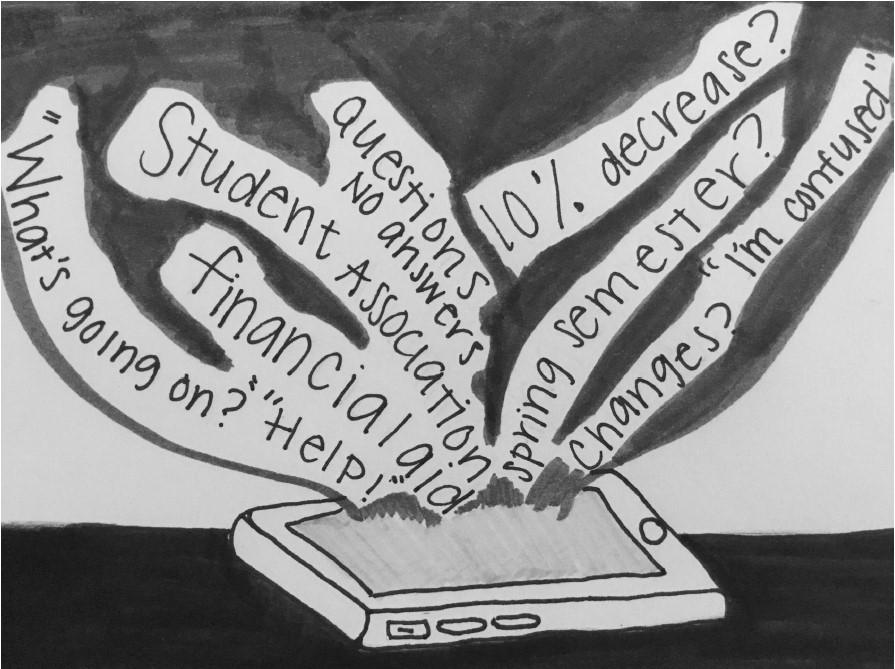Students should not learn about new University policies that affect them financially, academically and socially through social media – nor should they be left guessing about what some vague public statement means for them. They should learn about it from the officials themselves.
Turn to the Facebook page “Overheard at GW” and you’ll find several students wondering what happened to their financial aid packages over the past couple of weeks. They wrote to officials that they had lost aid following the University’s decision to move online this fall. At the time, no student knew that nearly 5,000 packages were being recalculated in light of that decision, and “many” students’ new packages were determined incorrectly.
Had officials been in tune with their students on a large Facebook page like Overheard, they would have been able to pinpoint similar sources of confusion and clarify what happened to students’ aid before they were left guessing, using social media as a way to find some speculative answers. Students used hearsay to figure out how they were going to pay for the fall semester because GW didn’t properly communicate. No student should be left in the dark heading into a remote semester – officials must provide students with up-to-date information to prevent confusion and misinformation as soon as they see it on social media.

Hannah Thacker | Opinions Editor
Students should not need to make last-minute financial or academic decisions on information they hear from their peers rather than administrators, especially while we’re a week out from the start of classes. When the University first planned for a mix of online and in-person classes, officials should have told students how their aid would be affected had they chosen to take in-person or virtual classes. When GW later announced its move online, officials should have immediately notified students that their financial aid packages would be recalculated. Students would have had more time to financially prepare for the fall, whether that means getting another job or taking a gap semester to save money. Officials could have easily addressed the confusion if they had been monitoring the comments and posts from students on Facebook and Twitter.
These recent events, while stressful on their own, are part of an even larger issue: the University has not been communicating enough with students. This leaves room for speculation and confusion, as spaces like the student-run “Overheard at GW” Facebook page and Twitter become venues for sharing information and frantically speculating about what new policies mean.
These online spaces have been phenomenal resources for students to hear about each other’s experiences, and those who share crucial information with their peers are doing a genuine service for the student body. But confusion lends itself to misinformation. It should not be students’ jobs to parse vague statements from administrators, a problematic new hire or try and make a best guess about why their financial aid packages seemed to have been cut. As we approach a radically abnormal semester, GW needs to step up their game to prevent confusion from making students’ lives even more stressful.
One way the University can improve on their communication with students is to actually engage with these spaces where students are voicing their thoughts and feelings. If administrators scrolled through the Overheard page, they would almost certainly get a better sense of what areas need clarification than if they just relied on intuition. Officials actually responding in an ad hoc way to individual concerns could be counterproductive, as two officials giving two different responses to the same issue could heighten confusion instead of alleviating it. But paying more attention to what students are actually saying is an important way for administrators to get a sense of where they need to clarify certain policies or announcements. They do not need to respond to each individual concern on social media, but if many students are asking each other the same question or speculating about the same thing, that should at the very least prompt officials to release a statement or send out an email.
Clarity from administrators is always important, but given the online status of the fall semester and the uncertain status of the spring semester, it is even more crucial that students be well-informed. The pandemic means students are making agonizing decisions that will have a real impact on their future – and the least the University can do is provide us with the timely and accurate information that we need to make those calls.
The editorial board is composed of Hatchet staff members and operates separately from the newsroom. This week’s piece was written by opinions editor Hannah Thacker and contributing opinions editor Andrew Sugrue, based on discussions with managing director Kiran Hoeffner-Shah, managing editor Parth Kotak, sports editor Emily Maise, culture editor Anna Boone and design editor Olivia Columbus.
Want to respond to this piece? Submit a letter to the editor.

